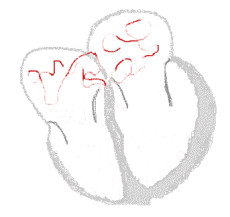Atrial fibrillation hypertrophic cardiomyopathy: Difference between revisions
No edit summary |
No edit summary |
||
| Line 58: | Line 58: | ||
[[Category:Cardiology]] | [[Category:Cardiology]] | ||
[[Category:Emergency medicine]] | [[Category:Emergency medicine]] | ||
[[Category:AFib]] | |||
[[de:Vorhofflimmern]] | [[de:Vorhofflimmern]] | ||
[[fr:Fibrillation auriculaire]] | [[fr:Fibrillation auriculaire]] | ||
Revision as of 15:33, 11 October 2012
| Conduction | ||
Sinus rhythm  |
Atrial fibrillation  | |
| ' | |
| ICD-10 | I48 |
|---|---|
| ICD-9 | 427.31 |
| DiseasesDB | 1065 |
| MedlinePlus | 000184 |
|
Atrial Fibrillation Microchapters | |
|
Special Groups | |
|---|---|
|
Diagnosis | |
|
Treatment | |
|
Cardioversion | |
|
Anticoagulation | |
|
Surgery | |
|
Case Studies | |
|
Atrial fibrillation hypertrophic cardiomyopathy On the Web | |
|
Directions to Hospitals Treating Atrial fibrillation hypertrophic cardiomyopathy | |
|
Risk calculators and risk factors for Atrial fibrillation hypertrophic cardiomyopathy | |
Editor-In-Chief: C. Michael Gibson, M.S., M.D. [1]; Associate Editor(s)-In-Chief: Cafer Zorkun, M.D., Ph.D. [2]; Varun Kumar, M.B.B.S.
Synonyms and related keywords: AF, Afib, fib
Overview
In patients with hypertrophic cardiomyopathy (HOCM), the factors that contribute to systemic embolism [1][2][3][4] include atrial fibrillation, advanced age,[4] hypertension, mitral annular calcification, and left atrial enlargment.[2] AF has been shown to be associated with an increased risk for HCM-related death (odds ratio 3.7; P<0.002) secondary to excess heart failure-related mortality but not sudden cardiac death. AF patients were also at an increased risk for stroke (odds ratio 17.7; P=0.0001) and severe functional limitation (odds ratio for NYHA class III or IV, 2.8; P<0.0001).[5] Antiarrhythmic agents such as disopyramide, propafenone, and amiodarone may be used to prevent AF episodes and modulate the rate of ventricular response in patients with HOCM.[6] The medical management of the patient with hypertrophic cardiomyopathy involves minimizing diastolic dysfunction, reducing left ventricular outflow tract obstruction, optimizing heart failure management, maintaining normal sinus rhythm, rate control and anticoagulation in the presence of atrial fibrillation, and implantation of an automatic implantable cardiac defibrillator in those patients who survive sudden cardiac death.
ACCF/AHA/HRS 2011 Guidelines for the Management of Atrial Fibrillation- Hypertrophic Cardiomyopathy (DO NOT EDIT) [7][8]
| Class I |
| "1. Oral anticoagulation (INR 2.0 to 3.0) is recommended in patients with hypertrophic cardiomyopathy who develop AF, as for other patients at high risk of thromboembolism. (Level of Evidence: B) " |
| Class IIa |
| "1. Antiarrhythmic medications can be useful to prevent recurrent AF in patients with hypertrophic cardiomyopathy. Available data are insufficient to recommend one agent over another in this situation, but (a) disopyramide combined with a beta blocker or non dihydropyridine calcium channel antagonist or (b) amiodarone alone is generally preferred. (Level of Evidence: C)" |
Vote on and Suggest Revisions to the Current Guidelines
Guideline Resources
- 2011 ACCF/AHA/HRS Focused Updates Incorporated Into the ACC/AHA/ESC 2006 Guidelines for the Management of Patients With Atrial Fibrillation [8]
- ACC/AHA/Physician Consortium 2008 clinical performance measures for adults with nonvalvular atrial fibrillation or atrial flutter [9]
References
- ↑ Hurley DM, Hunter AN, Hewett MJ, Stockigt JR (1981) Atrial fibrillation and arterial embolism in hyperthyroidism. Aust N Z J Med 11 (4):391-3. PMID: 6946758
- ↑ 2.0 2.1 Yuen RW, Gutteridge DH, Thompson PL, Robinson JS (1979) Embolism in thyrotoxic atrial fibrillation. Med J Aust 1 (13):630-1. PMID: 492021
- ↑ Staffurth JS, Gibberd MC, Fui SN (1977) Arterial embolism in thyrotoxicosis with atrial fibrillation. Br Med J 2 (6088):688-90. PMID: 902055
- ↑ 4.0 4.1 Bar-Sela S, Ehrenfeld M, Eliakim M (1981) Arterial embolism in thyrotoxicosis with atrial fibrillation. Arch Intern Med 141 (9):1191-2. PMID: 7259379
- ↑ Olivotto I, Cecchi F, Casey SA, Dolara A, Traverse JH, Maron BJ (2001) Impact of atrial fibrillation on the clinical course of hypertrophic cardiomyopathy. Circulation 104 (21):2517-24. PMID: 11714644
- ↑ Deedwania PC, Singh BN, Ellenbogen K, Fisher S, Fletcher R, Singh SN (1998) Spontaneous conversion and maintenance of sinus rhythm by amiodarone in patients with heart failure and atrial fibrillation: observations from the veterans affairs congestive heart failure survival trial of antiarrhythmic therapy (CHF-STAT). The Department of Veterans Affairs CHF-STAT Investigators. Circulation 98 (23):2574-9. PMID: 9843465
- ↑ 7.0 7.1 Fuster V, Rydén LE, Cannom DS, Crijns HJ, Curtis AB, Ellenbogen KA et al. (2006) ACC/AHA/ESC 2006 Guidelines for the Management of Patients with Atrial Fibrillation: a report of the American College of Cardiology/American Heart Association Task Force on Practice Guidelines and the European Society of Cardiology Committee for Practice Guidelines (Writing Committee to Revise the 2001 Guidelines for the Management of Patients With Atrial Fibrillation): developed in collaboration with the European Heart Rhythm Association and the Heart Rhythm Society. Circulation 114 (7):e257-354. DOI:10.1161/CIRCULATIONAHA.106.177292 PMID: 16908781
- ↑ 8.0 8.1 Fuster V, Rydén LE, Cannom DS, Crijns HJ, Curtis AB, Ellenbogen KA et al. (2011) 2011 ACCF/AHA/HRS focused updates incorporated into the ACC/AHA/ESC 2006 guidelines for the management of patients with atrial fibrillation: a report of the American College of Cardiology Foundation/American Heart Association Task Force on practice guidelines. Circulation 123 (10):e269-367. DOI:10.1161/CIR.0b013e318214876d PMID: 21382897
- ↑ Estes NA, Halperin JL, Calkins H, Ezekowitz MD, Gitman P, Go AS et al. (2008) ACC/AHA/Physician Consortium 2008 clinical performance measures for adults with nonvalvular atrial fibrillation or atrial flutter: a report of the American College of Cardiology/American Heart Association Task Force on Performance Measures and the Physician Consortium for Performance Improvement (Writing Committee to Develop Clinical Performance Measures for Atrial Fibrillation): developed in collaboration with the Heart Rhythm Society. Circulation 117 (8):1101-20. DOI:10.1161/CIRCULATIONAHA.107.187192 PMID: 18283199
de:Vorhofflimmern it:Fibrillazione atriale nl:Boezemfibrilleren no:Atrieflimmer fi:Eteisvärinä